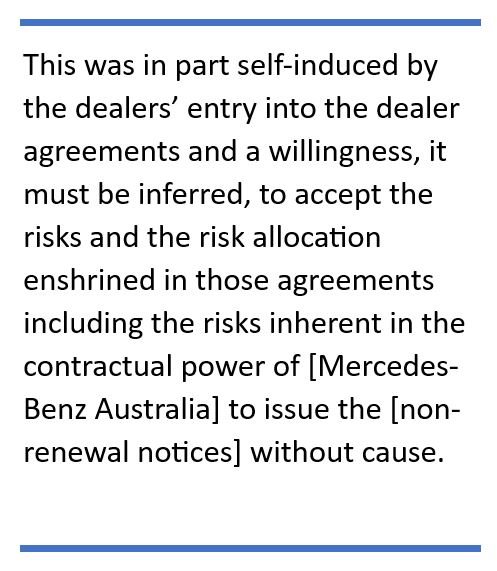A law suit, which was brought by 38 Mercedes-Benz dealers in Australia against the manufacturer after it introduced the agency retail model, has failed.
Australian Automotive Dealer Association (AADA) chief executive James Voortman said the result "will feel like a kick in the guts" to all franchised dealers.
In the UK, National Franchised Dealer Association (NFDA) chief executive Sue Robinson said the outcome of the Australian case "should not be regarded as a universal validation of the agency model".
The Mercedes retailers had argued that the switch from franchise contracts to agency model, as Mercedes Australia started direct to consumer new car sales, had cost them 650 million Australian dollars in lost goodwill from their balance sheets.
They claimed the huge value of goodwill was transferred to Mercedes-Benz under the agency sales agreements, which they claimed they were required to sign or they would have their Mercedes businesses taken away.
The applicants’ case was based, in part, on allegations that Mercedes' conduct, both in the manner in which it introduced the agency model and the agency terms involved, was unfair and contrary to the concept of good faith, as enshrined in the Australian Franchising Code (and certain terms implied by local consumer law).
 In his decision, Justice Jonathan Beach at Australia's Federal Court found against the claimants and their claims are to be dismissed, however he praised them for "a powerful and very thorough forensic case".
In his decision, Justice Jonathan Beach at Australia's Federal Court found against the claimants and their claims are to be dismissed, however he praised them for "a powerful and very thorough forensic case".
"The applicants were successful on many issues of fact, but lost on the law, essentially," justice Beach added.
Australian Automotive Dealer Association (AADA) chief executive James Voortman said naturally automotive dealers across Australia will be very disappointed with this judgment.
"“This will feel like a kick in the guts not only to the Mercedes dealers, but to all franchised new car dealers and for that matter all of Australia’s franchisees.”
“I do note that the judge said that while the dealers were successful on matters of fact, they failed on matters of law."
He also stated that further consideration needs to be given to the terms of the Franchising Code and possible modification.
“The AADA will use the learnings from this case in our input to the Federal Government’s review of franchising to call for stronger protections.”
Mercedes-Benz Australia Pacific said in a statement: “We welcome the court’s decision. Our focus continues to be on delivering luxury, high performance cars for our valued customers around Australia.”
“I accept that the dealers were ultimately placed in a position of situational disadvantage and possibly constitutional disadvantage in terms of the agency model,” Justice Beach wrote in his judgment.
“But in a sense this was in part self-induced by the dealers’ entry into the dealer agreements and a willingness, it must be inferred, to accept the risks and the risk allocation enshrined in those agreements including the risks inherent in the contractual power of to issue the without cause.
“They made the relevant capital investments knowing of or when they ought to have known of such risks. And on a broader front, the dealers were well-heeled individuals and corporations that hardly had any socio-economic vulnerability.”
 In reaction to the court's findings, Robinson of the NFDA said: "The decision may be appealed, and the NFDA will provide an update in due course; however, the case is, in any event, of limited relevance to the position of dealers or agents in the UK, where, despite certain similarities, the regulatory position is different.
In reaction to the court's findings, Robinson of the NFDA said: "The decision may be appealed, and the NFDA will provide an update in due course; however, the case is, in any event, of limited relevance to the position of dealers or agents in the UK, where, despite certain similarities, the regulatory position is different.
"For example there is currently no ‘franchising code’ for the automotive sector in the UK, although the NFDA is working towards the development of such an instrument, following guidance issued by the UK’s Competition and Markets Authority.
"The outcome of the Australian case should not be regarded as a universal validation of the agency model, in whatever form; indeed, the Competition and Markets Authority is in no way constrained by this decision were it minded to undertake a more targeted examination of any transition to agency or the terms applied to dealers in the UK."






















Login to comment
Comments
No comments have been made yet.